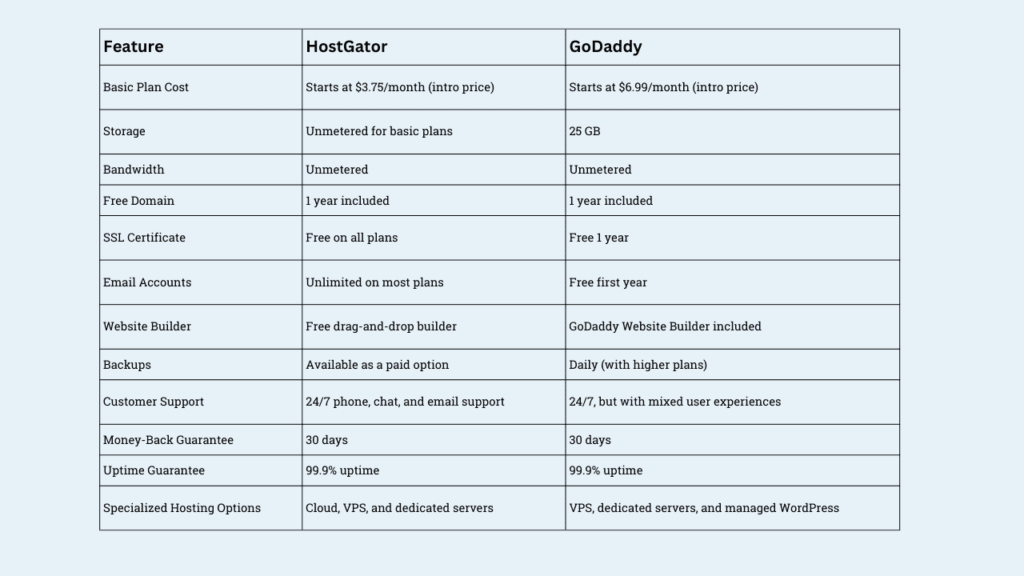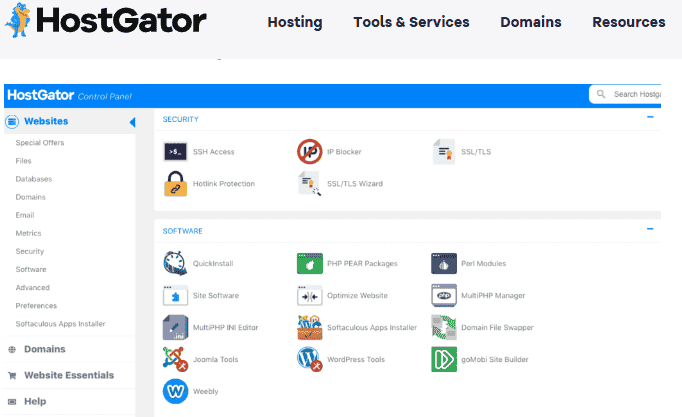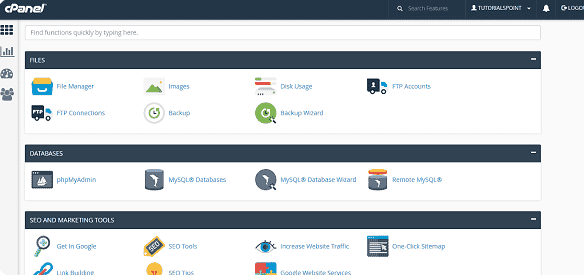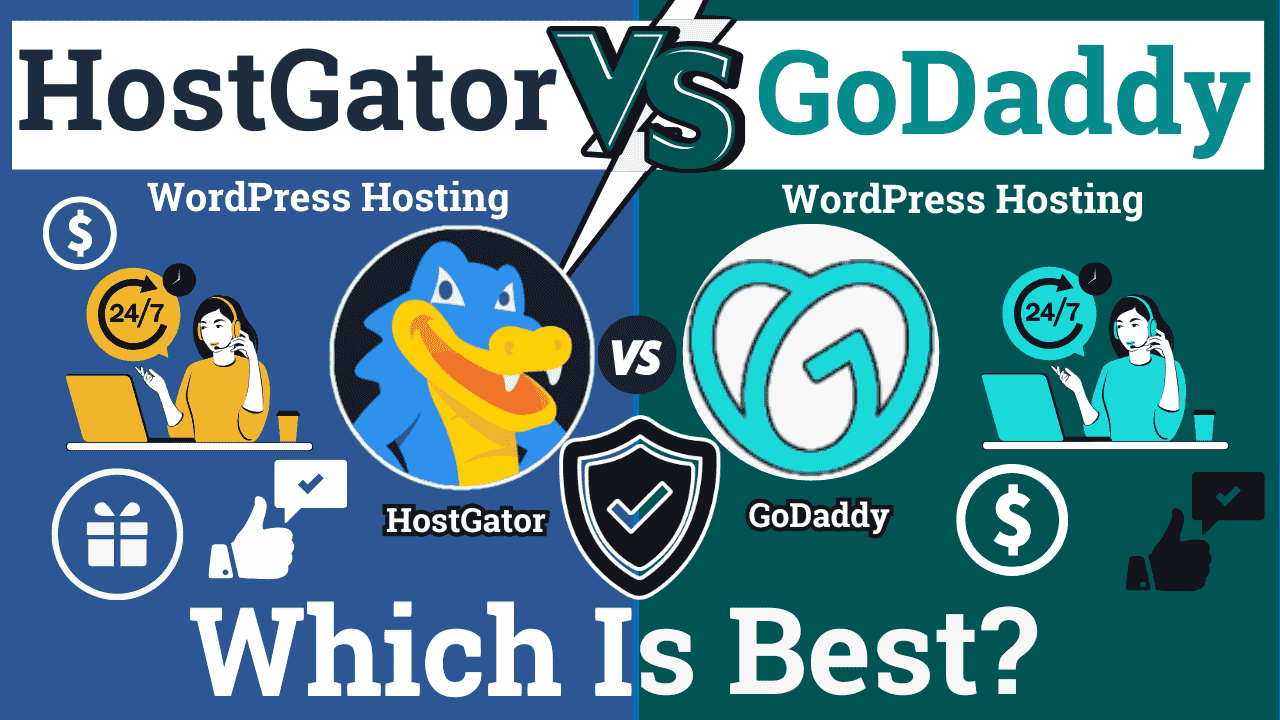Choosing the right web hosting provider can make or break your website’s success. For many website owners, HostGator vs GoDaddy is a crucial comparison to understand the pros and cons of each. With both being popular, affordable, and feature-rich, it can be tough to determine which host truly stands out. This post offers an unbiased look into each provider to help you choose the best fit for your website’s unique needs.
HostGator is a well-known web hosting company founded in 2002, offering a variety of hosting options, including shared, cloud, VPS, and dedicated hosting. Known for its 99.9% uptime guarantee, HostGator prioritizes reliability and performance. They offer 24/7 support via live chat, phone, and email, along with a user-friendly cPanel for managing websites. HostGator provides added perks like free website migration, SSL certificates, and sometimes a free domain for the first year, making it a good choice for individuals and businesses seeking affordable, reliable hosting. Unlock Your Success With HostGator: 6 Ultimate Service Offered
GoDaddy is a prominent web hosting and domain registration company founded in 1997, based in Arizona, USA. Initially starting as a domain registrar, it has expanded to offer a variety of hosting solutions, including shared, VPS, dedicated, and specialized WordPress hosting. Known for its user-friendly services, GoDaddy provides an integrated website builder, 24/7 customer support, and various marketing tools like email hosting and SEO services. As one of the largest domain registrars globally, GoDaddy is particularly well-suited for small businesses and individuals seeking a comprehensive, all-in-one online solution.
Table of Contents
Hosting Plans and Flexibility
Both HostGator and GoDaddy offer a range of shared hosting plans to accommodate different user needs. For those just starting, shared hosting is a popular and budget-friendly option. HostGator offers several tiers, each with ample unmetered bandwidth and SSD storage to ensure quick load times and smooth user experience. GoDaddy also provides comparable shared hosting plans, but HostGator’s options are generally more flexible and affordable, which makes it an attractive option for beginners and small businesses.
For users needing more power, both hosts offer VPS hosting and dedicated servers. However, HostGator often shines in terms of scalability, making it easier for users to transition smoothly between different plans as their needs evolve.

Performance and Load Times: HostGator vs GoDaddy
When comparing HostGator vs. GoDaddy in terms of performance, it’s important to consider speed and reliability. HostGator is known for its industry-standard performance metrics, boasting quick load times that keep websites running smoothly. GoDaddy, on the other hand, has made significant improvements over the years but doesn’t always match HostGator’s speed and consistency, particularly under heavy traffic.
HostGator’s use of SSD storage in its higher-tier plans also provides an extra boost for those looking for top-notch speed, which can be crucial for e-commerce websites or businesses relying on fast page load times.
Security Features: HostGator vs GoDaddy
Both hosting providers understand the importance of website security. They offer essential security features like SSL certificates, daily backups, and malware scans. HostGator includes free SSL certificates in its plans, a feature that is sometimes considered an upgrade with other providers. GoDaddy also provides SSL certificates but may charge additional fees depending on the package.
One thing to note: GoDaddy doesn’t include automated daily backups in its basic packages, a feature that HostGator offers to give users extra peace of mind. If data security and automated backup features are priorities for your business, HostGator might be the better choice.
Website security is a vital consideration when selecting a host. HostGator and GoDaddy both offer essential security features, including SSL certificates, malware scanning, and DDoS protection. However, there are some differences in what is included with each provider’s plans:
HostGator offers free SSL certificates with its hosting plans, providing a layer of protection for every site on its platform. Additionally, it provides automated daily backups, which add a level of security and reliability.
GoDaddy include automated daily backups in its basic packages; this may be a dealbreaker for users who prioritize frequent data backups. While it does offer backup options, they typically come as an add-on, meaning extra cost.
Customer Service and Support: HostGator vs GoDaddy
In terms of customer support, HostGator and GoDaddy both provide options like live chat support and 24/7 access to help resources. However, HostGator consistently earns higher ratings for its customer service, with prompt response times and knowledgeable staff available through multiple channels.
GoDaddy does provide phone support and has a solid knowledge base, but users often report longer wait times and slower responses. If you value quick, reliable customer support, especially during peak hours, HostGator’s customer service might offer you a more dependable experience.

User Experience and Website Builders: HostGator vs GoDaddy
HostGator and GoDaddy both prioritize user experience, with intuitive dashboards that make managing websites simple, even for beginners. HostGator’s cPanel-based interface is user-friendly and integrates with a range of popular website builders, including WordPress and Weebly, allowing users to customize their website-building process.
GoDaddy offers its own website builder as part of its packages, designed with drag-and-drop functionality, making it a good choice for beginners who want to get online quickly. However, for those who prefer more control or plan to use WordPress or another platform, HostGator’s flexible approach may offer a better experience.
For beginners, GoDaddy’s built-in website builder can be a great advantage. However, if you prefer using WordPress or want greater flexibility, HostGator’s cPanel setup offers better integration with external builders.

Image reference: HostGator.com

Image reference: GoDaddy.com
Additional Perks and Freebies: HostGator vs GoDaddy
Lastly, both HostGator and GoDaddy provide attractive extras for new users. Both HostGator and GoDaddy offers a free domain for the first year with most of its plans, However, HostGator’s plans are generally more generous with included extras, such as Google Ads credits and SEO tools, which can be invaluable for new website owners aiming to boost visibility.
Pricing and Value for Money
Both hosts offer competitive pricing, with HostGator vs GoDaddy costs being fairly similar for entry-level plans. However, HostGator’s introductory pricing often includes more features at a lower cost, while GoDaddy’s renewal rates can be slightly higher. For budget-conscious users, HostGator may provide better value, especially for first-time site owners.
HostGator vs GoDaddy: Which Should You Choose?
When it comes to HostGator vs GoDaddy, both have strong offerings, but each is tailored to different types of users:
- Choose HostGator if you prioritize performance, flexibility in hosting plans, strong customer service, and robust security features.
- Choose GoDaddy if you prefer simplicity, value a built-in website builder, or want to access additional business tools.
- With these six features in mind, you’re better equipped to choose a provider that meets your specific needs and helps your website thrive.
Ultimately, HostGator vs GoDaddy comes down to your specific needs. For users who need reliable performance, flexible hosting plans, and better customer support, HostGator is an excellent choice. On the other hand, GoDaddy is ideal for beginners who prioritize a simple website-building experience with integrated tools. Choose the provider that aligns with your website’s goals and long-term needs to ensure success.
Pros and Cons Summary
- HostGator Pros: Consistent uptime, excellent customer support, free SSL and daily backups, affordable pricing
- HostGator Cons: Limited customization on entry plans
- GoDaddy Pros: Beginner-friendly website builder, flexible plans, integrated business tools
- GoDaddy Cons: Slower support response times, backups cost extra on lower-tier plans
Ideal for: Beginners who want simplicity (GoDaddy) or those looking for performance and reliability (HostGator).
FAQ: HostGator vs. GoDaddy
1. What are the main differences between HostGator and GoDaddy?
In the HostGator vs. GoDaddy comparison, the main differences come down to flexibility, performance, and additional features. HostGator typically offers more flexibility in its shared hosting plans, including SSD storage for quicker load times, free SSL certificates, and daily backups. GoDaddy, while known for simplicity and an intuitive website builder, may have fewer included extras on its lower-tier plans.
2. Is HostGator faster than GoDaddy?
Yes, in most cases, HostGator vs. GoDaddy speed tests show HostGator as the faster choice. HostGator’s use of SSD storage on select plans and optimized infrastructure often leads to quicker load times and a more consistent performance.
3. Which hosting provider offers better customer support, HostGator or GoDaddy?
HostGator vs. GoDaddy customer support often favors HostGator, as they’re known for quick response times and 24/7 live chat support with knowledgeable agents. GoDaddy also offers live chat and phone support, but some users experience longer wait times, especially during peak hours.
4. Does HostGator or GoDaddy offer free domains?
Both HostGator and GoDaddy offer a free domain for the first year with many of their hosting plans. This is an attractive feature for new website owners, as it can help reduce the initial setup cost. HostGator also often includes additional perks, like Google Ads credits, to help new sites grow online.
5. Which provider is better for security: HostGator or GoDaddy?
In the HostGator vs. GoDaddy security comparison, HostGator tends to come out ahead. HostGator offers free SSL certificates and daily backups with its hosting plans, providing users with essential security features from the start. GoDaddy offers similar security tools but may charge extra for certain services like backups.
6. Is GoDaddy’s website builder easier to use than HostGator’s options?
If you’re looking for an all-in-one website builder, GoDaddy offers a straightforward, drag-and-drop builder that’s ideal for beginners. HostGator also supports website builders, but it uses cPanel, which integrates with third-party builders like WordPress. GoDaddy’s builder may be better for beginners, while HostGator’s setup offers more flexibility for users who prefer more control over customization.
7. Should I choose HostGator or GoDaddy if I need VPS hosting?
Both HostGator and GoDaddy offer VPS hosting with scalable options for users needing more power. HostGator’s VPS hosting often provides better flexibility and a slightly more affordable range of options, making it suitable for growing websites.
8. Which host is better for eCommerce websites: HostGator or GoDaddy?
For eCommerce sites, HostGator vs GoDaddy is a close call. Both providers offer robust options, but HostGator’s superior speed and free SSL certificate make it an attractive choice for sites that prioritize security and fast load times. GoDaddy’s website builder may simplify the setup process, but HostGator’s flexibility is preferred by users needing custom solutions.






